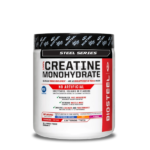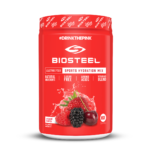KGB Vol 13: A hockey player’s guide to supplementation
The world of performance supplementation is difficult to navigate. The game of hockey is unique in that it relies on short sprints repeatedly performed over a long period of time. Add body contact to that mix and we have an environment that requires a detailed nutritional approach.
In this issue of KGB, I will attempt to help clarify the what and why of supplementation for hockey players. I will start by trying to break this down into two subgroups: 1) everyday things that can be done without the need to add supplementation (“low-hanging fruit”), and 2) advanced nutritional strategies.
What do we know about the game?
“…elite-level ice hockey requires a high level of fitness in terms of muscle mass and explosive strength, as well as a well-developed high-intensity intermittent exercise capacity.”
In plain English, this means that body composition matters. Too much fat or not enough muscle can both have a negative impact. Explosive strength is pretty self explanatory, but intermittent exercise capacity is the ability to repeat sprints with relatively equal intensity from one sprint to the next. This is a very very important quality to train and support with a healthy lifestyle.
LOW-HANGING FRUIT
The low-hanging fruit includes two (simple to describe, but harder to do) strategies, sleep health and optimal nutrition. Beyond this, there is an entire universe surrounding advanced nutrition which will boost your game, leading to enhanced recovery and improved performance.

Sleep Health
What is all the buzz about sleep? You can sleep when you’re dead, right? Why care about getting in the proper amount of quality shut-eye?
Poor sleep leads to a host of performance issues but the most notable are:
- Impaired focus
- Impaired skill acquisition
- Impaired sugar metabolism
- Increased inflammation
- Impaired cardiovascular health
- Impaired muscle gain
None of these are good and improving sleep checks a lot of boxes in the quest for high-level performance. There are a couple of simple approaches that can help:
- Schedule time for adequate sleep and protect that schedule like an empty net. Be consistent on non-game days, especially in the midst of the season. Napping is a very powerful tool; set an alarm for either 20 or 90 minutes. These are two simple and effective nap lengths.
- Create a bedtime ritual that supports your sleep schedule including a consistent sleep and wake time whenever possible – and work to make it possible!
- Avoid stimulation (video games, TV, general screen time) including intense exercise at least one hour before your scheduled bed time.
- Consider some supplements that could help:
- Magnesium – 200-350 mg can be used before bed to help improve sleep
- Melatonin – If you have a hard time falling asleep, start by taking 0.5 mg 30 minutes before bed. Increase by 0.5 mg as needed but do not exceed 5.0 mg. There are time-release capsules that may be more impactful.
- Glycine – While this is not typically a sleep supplement, research has reported that users fall asleep faster and feel more rested the next day. Try 3g 30 minutes before bed for a week then take a few weeks off. Short intervals like this will help prevent the benefits from wearing off.
Optimal Nutrition
The science is in: No athlete achieves a high level of performance without giving attention to eating habits and nutrition. (Okay, not “new” news, but something we all need to hear over and over. And, while following your grandma’s advice to “eat something green” every day, research points to some basic ways that we can up our game.
When I counsel clients on nutrition, I generally emphasize that we should eat 3-4 full meals per day, avoid temptation to “graze” on foods, optimize protein, give proper attention to carbohydrate consumption and eat enough fat.
We can also go into a bit more detail on some of these themes.
- Protein – Daily protein intake in grams should equal body weight x .9 (For example, a 200-pound athlete x .9 = 180 grams of protein per day.) In general, a serving of protein is the size of the palm of your hand including the thickness. Typically, 4-6 palm-sized servings will get you in the ballpark
- Carbs – Daily intake of carbs depends on your level of activity. For hockey players, 1.8-3.2 grams per pound of body weight is a general range to explore. If you are trying not to lose mass, maybe explore the higher ranges. If you are trying not to maintain your mass and need to consider staying lean, explore lower ranges and monitor your energy levels. It is also important to pay attention to carb timing, as in plan to consume more carbs around the exertion of competition/training.
- Fats – Healthy fats are essential for recovery as they are crucial in hormone production. Choosing healthy oils for cooking and dressing vegetables is a great start. Olive oil is a great option for this. Adding nuts and seeds to your snacking regimen is another healthy way to add good fat to your diet.
This is a broad-stroke conversation but, in general, athletes need optimal levels of protein intake as well as enough energy surplus from carbs and fats to sustain high levels of output.
And, to keep Grandma happy, I’ll add this note: Vegetables are one of the most valuable groups of foods you can add to your current nutritional approach. If you don’t like many vegetables, that is fine; stick with the ones you like and eat them consistently. If you need help, look to a greens powder for occasional use or a multivitamin.
ADVANCED NUTRITION
Below you’ll find some notes on higher-level changes you can make in your approach that will give you an edge on your competition as well as help you get past tough workouts and competitions. All suggestions are specific to the game of hockey and the type of energy required to achieve optimal performance.
Improved Performance
- Caffeine – Used for decades to increase endurance, focus and power, caffeine has been used across several sports. Risk must be considered as it has the ability to produce dependence as the body becomes tolerant of the product. For aerobic performance, take 100-200 mg one hour before exercise. For anaerobic performance, take 400-600 mg 30 minutes before intense exercise no more than two times per week. Exceeding 400 mg in a day is not recommended on a regular basis.
- Beta Alanine – This is a great supplement for high-intensity athletes who perform in 1-4 minute increments. It works to buffer the acidic byproduct of intense exercise. This buffering delays muscle fatigue improving tissue endurance. Take 4-6g per day with food. A common side effect is a feeling of numbness and may require taking a smaller dose.
- Nitrates – Found in food (beetroot and leafy green vegetables), nitrates can improve endurance, energy output, blood flow and muscle recovery. Sources include (very high) *arugula, collard greens, dill, turnip greens; (high) beetroot, *bok choy, celery, kale, kohlrabi, lettuce, mustard greens, parsley, radish, rhubarb, spinach, swiss chard, turnip, watercress (*best overall sources)
Enhanced Recovery

- Creatine – Supplementing with creatine has been researched for decades and is supported by strong evidence in its ability to increase power output and anaerobic endurance. Both of these qualities are essential for elite performance in hockey. Taking 5g of creatine monohydrate daily is enough to realize these benefits. Other forms of this product have been marketed but none have the body of research like monohydrate. In most cases, timing is not essential and creatine can be taken at any point during the day, but taking with food may help with any potential risk of an upset stomach.
- Vitamin D3 – Spending the cold winter months in a hockey rink can lead to suboptimal levels of vitamin D. It can be difficult to find naturally in foods and may need to be supplemented. Taking 2000-3000 IU of vitamin D3 with a meal containing fat can, among other things, maintain optimal levels of testosterone and improve recovery from training or competition.
- Collagen – When addressing joint health, collagen is a great first step. Collagen is the most abundant protein in the human body. Taking 15-20g of hydrolyzed collagen one hour before exercise may help heal damaged tissue and prevent cartilage loss; 10-15g of gelatin is also a suitable substitute for hydrolyzed collagen.
- Electrolytes – Rapid rehydration after intense competition is essential for repeated optimal performance. Sodium and potassium are the key electrolytes that need to be managed. Sodium (Na+) requires larger amounts to replenish (50-60mmol/L) where potassium is lower (10-20mmol/L). Because this ratio is difficult to understand, look for rehydration products like LMNT or the very popular Biosteel hydration mix to find proper balance.


Sources:
Vigh-Larsen JF, Beck JH, Daasbjerg A, et al. Fitness Characteristics of Elite and Subelite Male Ice Hockey Players: A Cross-Sectional Study. J Strength Cond Res. 2019;33(9):2352-2360. doi:10.1519/JSC.0000000000003285
Maughan RJ, Burke LM, Dvorak J, et al. IOC consensus statement: dietary supplements and the high-performance athlete. Br J Sports Med. 2018;52(7):439-455. doi:10.1136/bjsports-2018-099027
Patel, Kamal, and Sol Orwell. Examine.com Fitness Guide. Examine.com, 2019